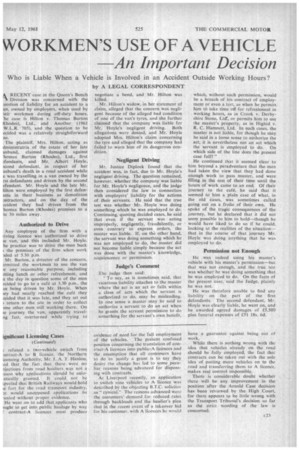ignificant Licensing Cases .
Page 59

If you've noticed an error in this article please click here to report it so we can fix it.
(Continued)
s. refused a two-vehicle switch from entract-A to B .licence. the Northern icensing Authority, Mr. J. A_ T. Hanlon, Lid that the 'faet . that there. were no ejections from road hauliers was not a :ason why applications .should he autoetically granted. It could not he :pected that British Railways would hold ic fort for the road transport industry. et. would unopposed applications be .anted without proper. evidence.
He went on to add that applicants who Lught to get into public haulage by way contract-A licences must produce evi.dence of need for the full employment of the vehicles. The pre:sent confused position concerning the translation of contract-A licences into public-A licences and the assumption that all customers have to do to justify a grant is to say they desire the change has led to some,peculiar reasons being advanced for dispensing with contracts.
At Liverpool recently, an application to switch nine vehicles to A licence was described by the objecting B.T.C. solicitor as " cynical." The reasons advanced were the custoniers' demand for reduced rates through backloads and the haulier's plea that in the recent event of a takeover bid for his customer, with A licences he would
have a guarantee against being out of work.
While there is nothing wrong with the idea that vehicles already on the wed should be fully employed, the fact that contracts can be taken out with the sole idea of putting more vehicles on to the road and transferring them to A licence, makes real control impossible.
There is considerable doubt whether there will be any improvement in the position after the Arnold Case decision has been reviewed by the High Court, for there appears to be little wrong with the Transport Tribunal's decision so far as the strict wording of the law is concerned.
























































































































